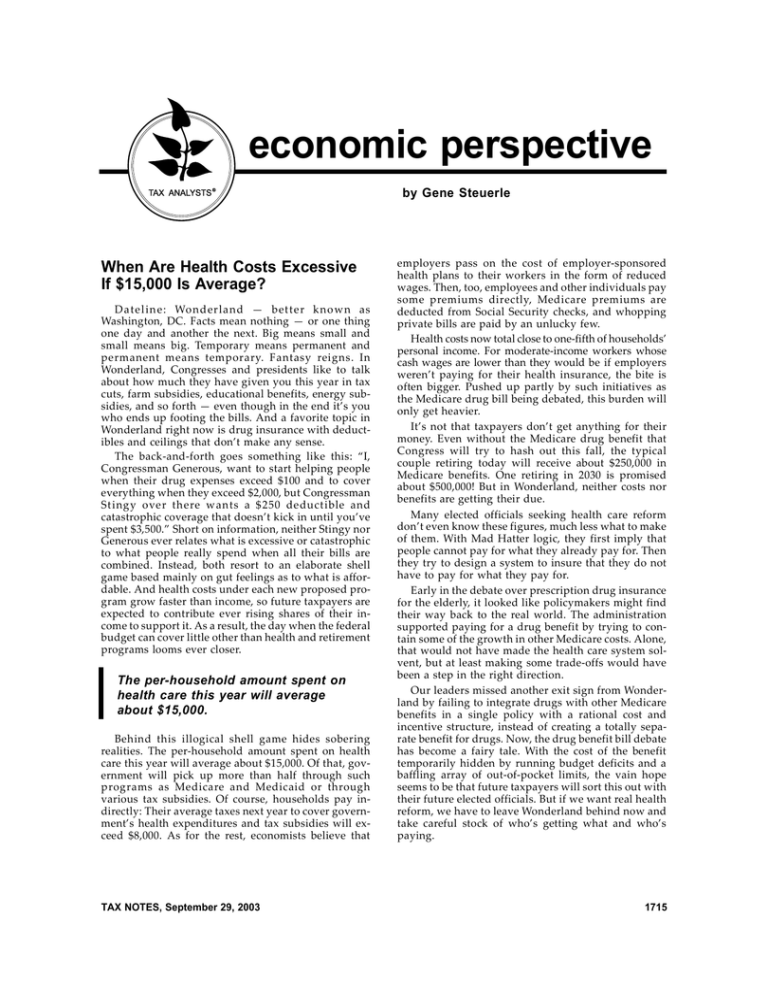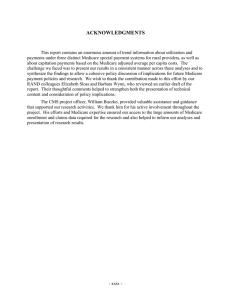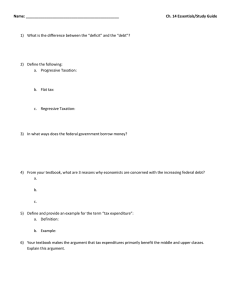When Are Health Costs Excessive If $15,000 Is Average?
advertisement

economic perspective TAX ANALYSTS ® When Are Health Costs Excessive If $15,000 Is Average? D a t e l in e : Wo n d er la n d — b et t e r k n o w n as Washington, DC. Facts mean nothing — or one thing one day and another the next. Big means small and small means big. Temporary means permanent and permanent means temporary. Fantasy reigns. In Wonderland, Congresses and presidents like to talk about how much they have given you this year in tax cuts, farm subsidies, educational benefits, energy subsidies, and so forth — even though in the end it’s you who ends up footing the bills. And a favorite topic in Wonderland right now is drug insurance with deductibles and ceilings that don’t make any sense. The back-and-forth goes something like this: “I, Congressman Generous, want to start helping people when their drug expenses exceed $100 and to cover everything when they exceed $2,000, but Congressman St ing y ove r th ere w an ts a $ 250 de duct ible and catastrophic coverage that doesn’t kick in until you’ve spent $3,500.” Short on information, neither Stingy nor Generous ever relates what is excessive or catastrophic to what people really spend when all their bills are combined. Instead, both resort to an elaborate shell game based mainly on gut feelings as to what is affordable. And health costs under each new proposed program grow faster than income, so future taxpayers are expected to contribute ever rising shares of their income to support it. As a result, the day when the federal budget can cover little other than health and retirement programs looms ever closer. The per-household amount spent on health care this year will average about $15,000. Behind this illogical shell game hides sobering realities. The per-household amount spent on health care this year will average about $15,000. Of that, government will pick up more than half through such programs as Medicare and Medicaid or through various tax subsidies. Of course, households pay indirectly: Their average taxes next year to cover government’s health expenditures and tax subsidies will exceed $8,000. As for the rest, economists believe that TAX NOTES, September 29, 2003 by Gene Steuerle employers pass on the cost of employer-sponsored health plans to their workers in the form of reduced wages. Then, too, employees and other individuals pay some premiums directly, Medicare premiums are deducted from Social Security checks, and whopping private bills are paid by an unlucky few. Health costs now total close to one-fifth of households’ personal income. For moderate-income workers whose cash wages are lower than they would be if employers weren’t paying for their health insurance, the bite is often bigger. Pushed up partly by such initiatives as the Medicare drug bill being debated, this burden will only get heavier. It’s not that taxpayers don’t get anything for their money. Even without the Medicare drug benefit that Congress will try to hash out this fall, the typical couple retiring today will receive about $250,000 in Medicare benefits. One retiring in 2030 is promised about $500,000! But in Wonderland, neither costs nor benefits are getting their due. Many elected officials seeking health care reform don’t even know these figures, much less what to make of them. With Mad Hatter logic, they first imply that people cannot pay for what they already pay for. Then they try to design a system to insure that they do not have to pay for what they pay for. Early in the debate over prescription drug insurance for the elderly, it looked like policymakers might find their way back to the real world. The administration supported paying for a drug benefit by trying to contain some of the growth in other Medicare costs. Alone, that would not have made the health care system solvent, but at least making some trade-offs would have been a step in the right direction. Our leaders missed another exit sign from Wonderland by failing to integrate drugs with other Medicare benefits in a single policy with a rational cost and incentive structure, instead of creating a totally separate benefit for drugs. Now, the drug benefit bill debate has become a fairy tale. With the cost of the benefit temporarily hidden by running budget deficits and a baffling array of out-of-pocket limits, the vain hope seems to be that future taxpayers will sort this out with their future elected officials. But if we want real health reform, we have to leave Wonderland behind now and take careful stock of who’s getting what and who’s paying. 1715







